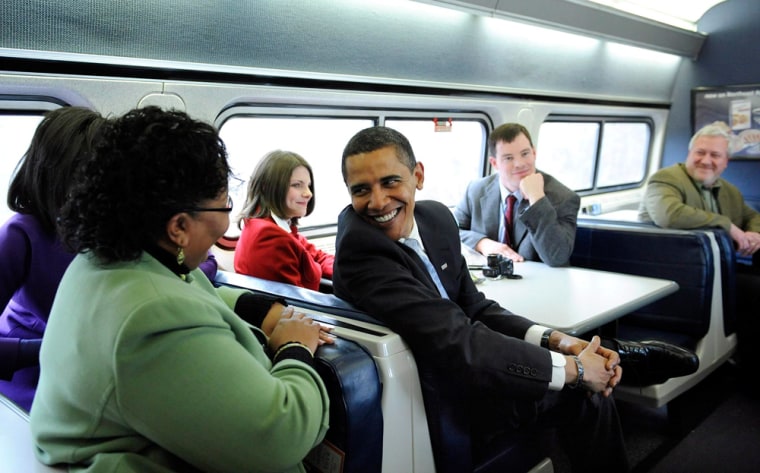Dear President Obama:
Congratulations on your historic election, and best wishes as you deal with the daunting issues facing the nation.
Heaven knows you have plenty of problems to deal with — Iraq, Afghanistan, an economy in tatters — and no shortage of supplicants seeking a bit of your time or a few billion dollars in funding. Your economic stimulus proposal, in particular, has unleashed a flood of financing requests for “shovel-ready” infrastructure-improvement projects from coast to coast.
Not surprisingly, the travel industry has its own wish list. A high-speed rail network. A new air traffic control system. More support for the national park system. Such projects, of course, will take billions of dollars and decades to complete.
In the meantime, I’d like to propose a few ways you can improve travel now. The following five action items won’t require billions of dollars, but rather, a bit of political will.
Fix FAA
Job No. 1 should be to resolve the conflict in the control tower. As president, you should insist that the nation’s air traffic controllers and FAA come to a mutually acceptable agreement on staffing, pay and working conditions. Resolution of this festering problem will encourage senior controllers to stay on, draw new ones to the industry and foster smoother operations in the tower and improved safety on the tarmac.
Speaking of safety, perhaps a revamped FAA could persuade the airline industry to bring some of their outsourced maintenance work back to U.S. soil. The agency has enough trouble keeping up with domestic inspections, let alone facilities in Singapore and South Korea. Thankfully, last week’s crash of US Airways Flight 1549 had nothing to do with faulty maintenance or missed inspections, but odds are future incidents will.
Provide air passengers real protection
Last week, Senators Barbara Boxer (D-CA) and Olympia Snowe (R-ME) reintroduced legislation requiring the airlines to provide food, water and working restrooms during onboard delays and to allow passengers to deplane after three hours. As a co-sponsor of their previous Airline Passenger Bill of Rights, you no doubt understand that the industry’s “voluntary” guidelines aren’t worth the paper they’re hardly ever printed on.
But while Congress deliberates, perhaps you could motivate the Department of Transportation (DOT) to revisit the regulatory rules on the subject. Under the previous administration, the agency couldn’t even come up with a rule on what constitutes a long delay, let alone how to handle them.
The thorniest issue, of course, is the three-hour deplaning proposal, which will need to balance passengers’ well-being and the complex logistics of airport operations. Reportedly Ray LaHood, your pick to head DOT, is a centrist consensus-builder, so maybe he can find that elusive middle ground.
Reinvigorate rail service
Taking the train from Philadelphia to Washington, D.C. for your inauguration — picking up Vice President Biden along the way — was a brilliant idea. Not surprisingly, it also got train buffs hyperventilating about a new era for train travel, especially high-speed rail.
Sounds great, although the price tag and timeframe are, shall we say, prohibitive. In the interim, several smaller efforts promise incremental improvements and warrant your support. Among other things, DOT should expand its support of smaller-scale projects (extended sidings, double-tracking, etc.) that facilitate flow and enforce recently passed legislation that lets the government fine track-owning railroads that fail to give passenger trains the priority they’re supposed to.
Fix infrastructure financing
It’s not exciting, it doesn’t make headlines and it won’t be easy, but this could be travel’s sleeper issue of the year. The Highway Trust Fund, the primary revenue source for the nation’s road and mass-transit improvements, is running dry. Supported by federal gas taxes (18.4 cents per gallon), the fund has been hard hit as Americans cut back on their driving (100 billion miles over the last 12 months).
And the problem will only worsen as more people opt for mass transit and buy more fuel-efficient cars (laudable as those efforts are). What to do? It won’t be popular, but raising the federal gas tax — the last increase was in 1993 — may be the only way to avoid further disrepair, more emergency appropriations and even bigger deficits.
Promote inbound tourism
And finally, an easy one. Once you work through the truly critical issues facing the nation, maybe you could convince your colleagues in Congress to resurrect the Travel Promotion Act, which was introduced last year to boost international visits to the U.S.
As a supporter of the original legislation, you already know that the campaign would be funded primarily through private sector contributions and fees paid by overseas visitors, rather than the U.S. Treasury. According to the U.S. Travel Association (formerly TIA), a $100 million campaign would result in $8 billion per year in new visitor spending and $850 million per year in federal tax revenue. That oughta be good for a few more shovels, don’t you think?
Rob Lovitt is a frequent contributor to msnbc.com. If you'd like to respond to one of his columns or suggest a story idea, drop him an e-mail.
